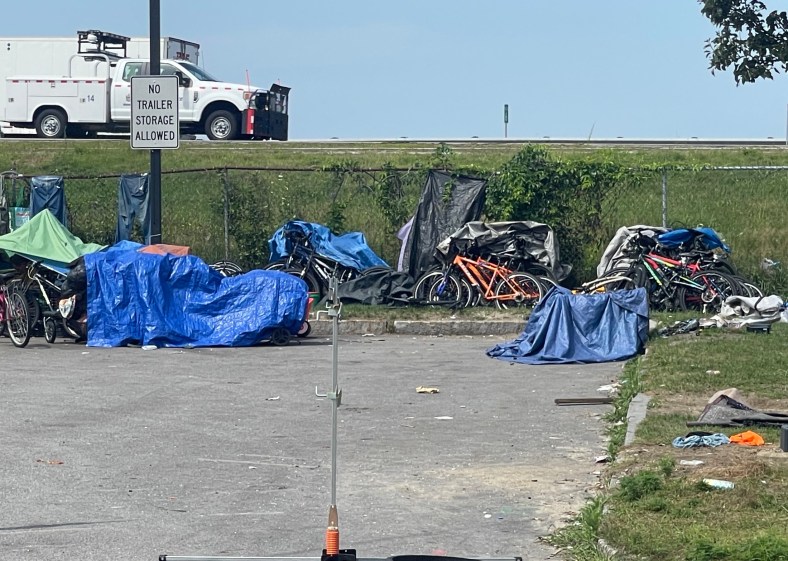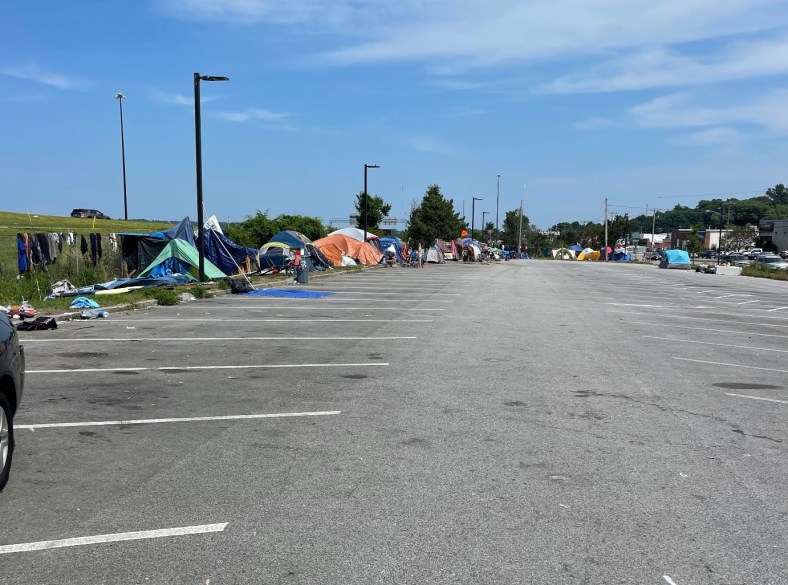On Thursday, Maine Wire Editor-in-Chief Steve Robinson and reporter Edward Tomic visited Portland’s largest three homeless encampments and spoke with local business owners about how the city’s homeless population is affecting their business operations.
The Maine Department of Transportation Park and Ride on Marginal Way recently became Portland’s second largest encampment, with over thirty tents lining the state land next to I-295.
The Park and Ride encampment formed after the encampment between the Portland Trader Joe’s and Whole Foods was shut down and cleaned out in May.
FULL PODCAST: The Maine Wire’s Steve Robinson and Edward Tomic recount their inspection of Portland’s open air drug markets:
The shifting settlements are part of an ongoing spat between the city and the State over whose responsibility it is to deal with the sprawling open-air drug markets and overdose hot zones that have sprung up amid ongoing housing and addiction crises roiling Maine.
When the Millsvilles are on city land, they’re a city problem, but when they’re on Department of Transportation land, they’re a State problem.
Last Wednesday, the Department of Transportation divided the Park and Ride in half with a concrete barrier, closing half of the parking lot (84 spaces) in order to accommodate the encampment. Residential use of the Park Ride location has collapsed, according to area business owners.
The encampment’s residents seemed jovial and fearless, selling, buying, and shooting up drugs in plain view of any passersby. There was even a dartboard setup near one tent for entertainment.
At 9:30am, a shirtless man in sweatpants could be seen obtaining something from a nearby tent before loading two needles with an unknown substance.
The first needle, he handed to a woman lying on the ground next him.
The woman proceeded to inject the substance into first her right hand, then her left, after which she appeared to be sedated. For the next few hours the only other thing she consumed was Pepsi.

The man then took the second shot and was later observed acted erratically and interacting with other campers excitedly.
The city has set up concrete barriers in a U-shape to function as a makeshift open-air dumpster for the encampment, although piles of trash have amassed elsewhere in the camp.


The smell is considerable even at a distance.
As many as fifty bikes sit outside the tents in the Park and Ride encampment, with several rows of bikes covered in tarps to protect them from the rain.

It’s unclear where all the bikes came from or who they belong to.

The Maine Wire observed the Marginal Way encampment for about an hour Thursday morning and did not see any police presence. Several City of Public Works trucks drove by, but none stopped, and the primary traffic into the lot appeared to be drivers who knew residents at the encampment.
When the State divided the Park and Ride in half, the Millsville moved away from a Greyhound bus stop on Marginal Way, but the tents packed together directly in front of several retail shops across the street.
Greyhound arrivals used to arrive at the intersection of Congress St. and Valley St. on the other side of the city, near MaineHealth and Hadlock Field. However, that property now serves as a food pantry, primarily for the population of unhoused migrants currently living in the Portland Exposition Building.
Not far from the food pantry is the largest encampment in the city, where about 50 tents are pitched, is in Portland’s Libbytown area, next to the Fore River Parkway. The encampment also includes more durable, wood-framed structures.

The Fore River encampment has been the primary focus of the city’s new Encampment Crisis Response Team (ECRT) — they have installed porta-potties, needle dumps, and are trying to get the people in the encampment into the city’s homeless shelters.
Portland’s Health and Human Services Director Kristen Dow said at a City Council Meeting in July that they are offering tours of shelter facilities to people living in the encampment to try to convince them to move into the shelters.

On Thursday, several nonprofit organizations and representatives from the City of Portland had set up a table at the entrance to the Fore River encampment, handing out food and water and trying to sign up homeless individuals for housing.
For 20 minutes or so Thursday afternoon, no encampment residents were observed signing up for housing.

City officials recently announced their plan to offer housing to every homeless person residing in the Fore River encampment before they shut it down and clean it on Sept. 6.
After witnessing a shirtless man brandishing a knife as he straddled a bike, it was decided that entering the encampment would be insalubrious for these correspondents.
Peering over the walled enclosure, a full hibachi grill and propane tank could be seen.


On Thursday, a line stretched outside of the food pantry during lunch time.

The third and smallest of the city’s encampments is in the Western Promenade area.
On Thursday, only three tents and few residents could be seen.
The previous day a 58-year-old man was found dead by Portland Police next to the cemetery.
Business Owners Plead for Help
Local business owners, all of whom requested anonymity for fear of retribution from the encampment residents or city officials, said that their please for help have gone unanswered.
One local business owner, who wished to remain anonymous because he feared one of his New Neighbors might “throw a brick through his window”, said he has had zero interactions with City Officials, State Officials, or the Governor’s Office despite numerous attempts to contact someone in government.
The property around his business, he said, is always littered with needles and human feces, a fact the Maine Wire confirmed.
The business owner said police officers had advised him to stay clear of camp inhabitants, as the police believed most tenters carried weapons and were dangerous. He fears daily for his customers and employees’ health and safety.

Another business owner who also asked to remain anonymous said that tourists frequently come into their shop asking for directions or to wait for Ubers because they do not feel safe standing next to the encampment.
Residents of the encampment come in looking to use the bathroom, or to charge their smartphones, he said.
The business owner called the situation a “sh– show,” and said that city officials have been unresponsive to their concerns over the safety of their employees and merchandise.
The store can no longer set up goods to advertise outside of the store and cannot leave goods unlocked in vans or loading docks out of fear that it will be stolen.
The business owners said that they have had people shoot up drugs on their property, and that they frequently find needles on sidewalks and parking lots outside of their store.
An ATM for a bank near one encampment has had to beef up security, with an alarm going off inside the ATM if someone is inside it for longer than six minutes, the business owner said. That precaution was taken after several incidents of people sleeping and defecating in the lobby.
Despite this, they said that police have generally been slow to respond to calls to the area and have not been charging any of the homeless individuals with crimes.
One of the business owners said it was generally known that arrested offenders would only be released without prosecution, so police had stopped bothering with arrests.
Jessica Grondin, director of communications for Portland, disputed the business owners’ characterization of the city’s response to concerned business owners.
“We have been in communication with business owners and have let them know about our Encampment Crisis Response Team and what we are able to do through that work,” Grondin said in a written statement to the Maine Wire.
“We’ve been in communication with anyone who has reached out, and have also shared information with the [Chamber of Commerce],” she said.
Regarding the needles and feces on business owners’ property, Grondin said the city was “not able” to assist them with clean up efforts on private property.
“While we’re not able to clean up things on private property, we are providing regular trash removal at the Park and Ride location,” she said.
Grondin said that once the Fore River encampment is cleaned up on Sept. 6, more than three weeks from now, the city’s attention will turn to the Marginal Way encampment.




Now these people complain! The smart people have always said that being a sanctuary city will turn into this type of situation. Two years ago they welcomed this to their city! Come one, come all! We want you here! They voted for this nonsense. What did they think was going to happen? I have no sympathy for the liberals in Portland. We do not want them in our towns. We cannot afford this. Now Mills wants to bring in 1000’s of more illegals into Maine! Be careful what you wish for.